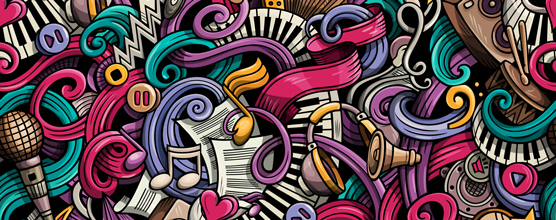
“The one who has never heard music is deaf, biologically,
The one who has never been moved by music is dead, emotionally,
The one who does not like music is deficient, aesthetically.”
It has been my contention for years as a former teacher of music that music is an aural and quite effective drug. It enters our system through our ears not our mouths and of crucial note, does not require our mental consent to affect us.
Music often bypasses our cognitive faculties and impacts our central nervous system for good or for ill depending on the nature of our psyche and state of being.
I know that ‘drug’ is a strong term to use for music but if you set aside the medical nuances of the word ‘drug’ (which are beyond my knowledge base) it would be difficult to argue against the point that music can have you so hooked or dependent on it that you find it difficult to operate without some of it in your daily life
Call it dependency, habit or whatever but the seeming inability to do without it on a daily basis is my suggested unscientific basis for calling it a drug or if you prefer a kind of drug.
Music, for another reason is a drug because we all seem so dependent on it. Ponder this fact of life; music is pervasive and popular, found almost everywhere and loved too. It is the most utilised artistic expression among youth and even adults. It is used in ads, movies, churches, at parties, etc.
In terms of societal reality it seems true to say “where music is not, nothing much of significance is.” We all rely on music for setting or changing mood.
But how is music powerful? It is powerful emotionally and educationally. When we rely on music for setting or changing mood we attest to the emotional power of music. The ancient Greeks had a concept of the ethos of a melody, namely, that music affects temperament and even character. The temperament (feeling) aspect we all can agree with but the character aspect may seem a pre-scientific age stretch. Ponder examples of this Greek view nonetheless.
Plato, the Athenian philosopher (c. 428-348 BC) said in his book Republic:
“Musical training is a more potent instrument than any other, because rhythm and harmony find their way into the inward places of the soul.”
Aristotle, another Greek philosopher (c. 384-322 BC) said in his work Politics:
“If a person habitually listens to the kind of music that rouses ignoble passions, his whole character will be shaped to an ignoble form. In short, if one listens to the wrong kind of music he will become the wrong kind of person; but conversely, if he listens to the right kind of music he will tend to become the right kind of person.”
It should be noted that modern Psychiatrists seem to share the character impact aspect of music’s emotional power. In the 1980s I interviewed noted Jamaican Psychiatrist Professor Fred Hickling and he did not hesitate to affirm the emotional power of music but nuanced his view carefully, citing his own experience growing up in a musical family.
During that same period I stumbled on the book Music and the Brain [eds. Critchley & Henson] in which a Psychiatrist, after comparing the impact of medication, smile, touch and music on mentally challenged patients said: “…music exerts a deeper influence on the patients’ personality and more particularly on their emotional life.”
We in Jamaica need to ponder the sage words of Scottish patriot Andrew Fletcher who opined: “Let me write the songs of a nation and I care not who makes its laws.”
Our laws, like all laws, are simply external standards of conduct and require our mental awareness and compliance but this aural drug’s emotional power can impact behaviour without waiting for our permission.
Even the most professedly spirit-filled conservative Christian, if honest, will admit to finding the toes wiggling up involuntarily, while hearing a rhythmic Jamaican pop song that said Christian would not sing or regard as commendable.
Music’s dual power is largely underrecognized and our concerns about music should transcend noise pollution.
